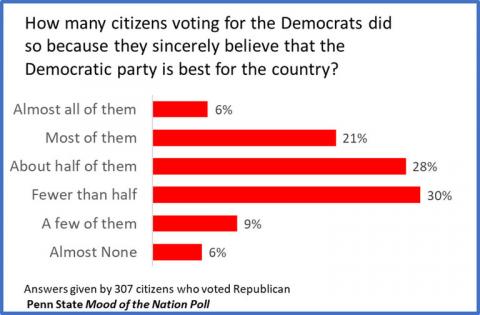
In the years since the 2016 election, countless news stories and public opinion polls have sought to answer the question of what divides Republicans and Democrats.
Results from the latest Penn State Mood of the Nation Poll show that not only do people with opposing political beliefs fundamentally disagree, they find it difficult — if not impossible — to put themselves in the shoes of someone from the other side.
The Mood of the Nation Poll, conducted by Penn State’s McCourtney Institute for Democracy, utilizes open-ended questions that allow participants to respond in their own words, express what’s on their minds, and provide unique observations on contemporary American politics.
A poll in the field days after the 2018 midterms asked citizens to imagine why people from the opposing political party voted the way they did. Responses indicate a reliance on stereotypes rather than a true sense of empathy across the aisle.
Specifically, Republicans said Democratic voters were “brainwashed by the propaganda of the mainstream media,” or voting solely in their self-interest to preserve undeserved welfare and food stamp benefits. Meanwhile, Democrats said that Republicans must be “very ill-informed,” or that “Fox News told me to vote for Republicans.” Or that Republicans are “uneducated and misguided people guided by what the media is feeding them.”
Overall, about 42 percent of Democrats felt that Republicans had the country’s best interest in mind when they cast their ballots. Only about 25 percent of Republicans felt the same way, with some expressing difficulty at the notion of trying to think like a Democrat at all.
“I honestly cannot even pretend to be a Democrat and try to come up with anything positive at all,” said a 53-year-old Republican from Virginia.
Eric Plutzer, the poll’s director and professor of political science at Penn State, said admitting that such an empathy gap exists may be the first step toward reducing political incivility and polarization.
“Voters like these — baffled but not hostile — would seem to represent an opportunity,” Plutzer said. “Whether such voters can long endure in today’s media and social media environment is a critical question. If they can endure and even grow, then the prospects for bipartisan cooperation in areas of shared concern will be possible. If not, polarization will continue to rise.”
Each Mood of the Nation Poll reflects answers provided by a scientifically selected, representative sample of 1,000 adults. Fieldwork is conducted in partnership with YouGov, an online polling organization.
For more information on the poll and its findings, visit the McCourtney Institute for Democracy website or listen to a conversation with Plutzer about the poll on an episode of the Institute's Democracy Works podcast.